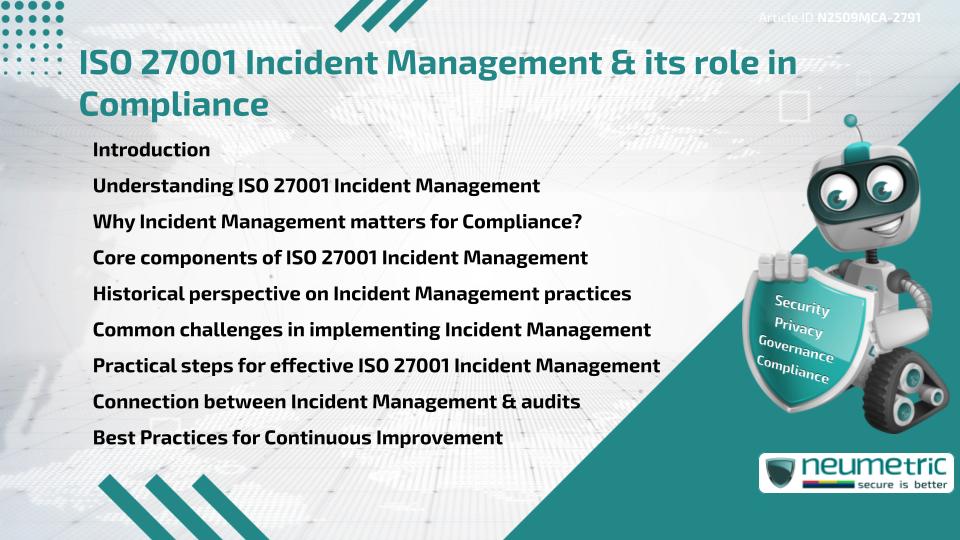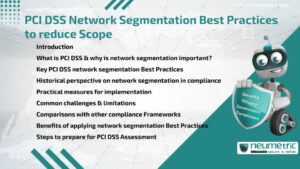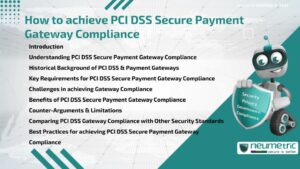Table of Contents
ToggleIntroduction
When a Security Incident occurs, how an Organisation responds determines whether it suffers lasting damage or recovers quickly. ISO 27001 Incident Management provides a structured way to handle such events, ensuring swift Detection, effective Response & ongoing Improvement. Beyond protecting Assets, Incident Management plays a central role in achieving Compliance with the ISO 27001 standard. This article explains what ISO 27001 Incident Management is, why it matters for Compliance, its components, challenges & best practices.
Understanding ISO 27001 Incident Management
ISO 27001 Incident Management refers to the documented Processes & Controls Organisations use to Identify, Report, Assess & Respond to Security Incidents. It is a mandatory element of the Information Security Management System [ISMS].
The goal is not just to stop Incidents but to minimise their impact, learn from them & strengthen resilience. Incident Management covers a wide range of scenarios including Malware Infections, Phishing Attempts, Unauthorised Access & Data Breaches.
Why Incident Management matters for Compliance?
Compliance with ISO 27001 requires Organisations to demonstrate they can detect & manage Incidents effectively. Incident Management provides Auditors with Evidence that the Organisation:
- Has clear Procedures for identifying & Reporting Incidents
- Responds promptly to mitigate Risks
- Reviews Incidents to prevent recurrence
- Documents Incidents for Accountability & Learning
Without robust Incident Management, Compliance efforts remain incomplete, as Auditors will not certify Organisations that cannot demonstrate effective response capabilities.
Core components of ISO 27001 Incident Management
An effective Incident Management process usually includes:
- Detection & Reporting: Systems & Staff identify unusual activity.
- Assessment & classification: Incidents are prioritised based on severity.
- Containment: Immediate actions prevent the spread of damage.
- Eradication & Recovery: Root causes are eliminated & systems restored.
- Documentation: Detailed records are maintained for Analysis & Audits.
- Lessons learned: Post-Incident reviews identify areas for improvement.
Together, these components ensure Incidents are managed in a consistent, repeatable way.
Historical perspective on Incident Management practices
In the early days of Cybersecurity, Incident Response was reactive, often limited to Technical fixes after Breaches occurred. Over time, growing Threats & Compliance Requirements pushed Organisations toward structured frameworks.
The adoption of ISO 27001 emphasised that Incident Management should be proactive, documented & integrated into the ISMS. This shift reflects the recognition that Incident handling is essential not just for security but also for Governance & Accountability.
Common challenges in implementing Incident Management
Organisations often face difficulties such as:
- Underreporting: Staff may ignore or fail to report minor Incidents.
- Lack of Training: Employees may not understand their role in the process.
- Resource constraints: Small Teams may struggle to monitor Incidents effectively.
- Overreliance on Tools: Automation helps but cannot replace Human judgment.
Acknowledging these challenges helps Enterprises design realistic & effective processes.
Practical steps for effective ISO 27001 Incident Management
To implement Incident Management successfully, Organisations should:
- Develop clear Policies & Procedures aligned with ISO 27001 requirements.
- Train Employees to recognise & Report Incidents.
- Use Monitoring Tools to detect unusual activities promptly.
- Define Roles & Responsibilities to avoid confusion during Response.
- Conduct post-Incident reviews to integrate Lessons learned.
These steps ensure Incident Management becomes part of daily operations rather than a reactive exercise.
Connection between Incident Management & audits
Auditors reviewing Compliance with ISO 27001 focus heavily on Incident Management. They expect to see documented Evidence such as Incident logs, response procedures & Lessons learned reports.
Strong Incident Management demonstrates accountability, Continuous Improvement & alignment with the ISMS. Weak or missing practices, on the other hand, can result in Nonconformities & failed Certification audits.
Best Practices for Continuous Improvement
To keep ISO 27001 Incident Management effective, Organisations should:
- Regularly test Incident Response procedures through simulations.
- Encourage a culture of transparency where all Incidents are reported.
- Involve cross-functional teams to improve communication.
- Align Incident Management with Business Continuity & Disaster Recovery plans.
- Review & update processes after every significant Incident.
These practices help Organisations maintain Compliance while strengthening overall resilience.
Takeaways
- ISO 27001 Incident Management is a structured process for Detecting, Reporting & responding to Security Events.
- It is essential for demonstrating Compliance with ISO 27001 requirements.
- Core components include Detection, Containment, Eradication, Recovery & Lessons learned.
- Historical practices shifted from Reactive fixes to Proactive Frameworks.
- Challenges include Underreporting, lack of Training & overreliance on Tools.
- Implementation requires clear Policies, Training, Monitoring & Accountability.
- Auditors evaluate Incident Management closely during Certification.
- Continuous Improvement through Testing & reviews keeps Processes effective.
FAQ
What is ISO 27001 Incident Management?
It is the process Organisations use to Identify, Report, Assess & Respond to Security Incidents as part of their ISMS.
Why is Incident Management important for ISO 27001 Compliance?
Because it demonstrates to Auditors that the Organisation can Detect, Respond to & Learn from Security Incidents effectively.
What are the main steps in Incident Management?
They include Detection, Reporting, Assessment, Containment, Eradication, Recovery & Lessons learned.
What challenges do Organisations face in Incident Management?
Common challenges include Underreporting, lack of Staff training, limited Resources & excessive reliance on Automation.
How does Incident Management affect Certification Audits?
Strong Incident Management provides Auditors with Evidence of Compliance, while weak practices can lead to Nonconformities.
How often should Incident Management Processes be tested?
They should be tested regularly, ideally at least once a year or after significant changes to systems.
Who is responsible for managing Incidents?
Responsibility is shared across the Organisation but typically led by an Incident Response Team with defined roles.
Need help for Security, Privacy, Governance & VAPT?
Neumetric provides Organisations the necessary help to achieve their Cybersecurity, Compliance, Governance, Privacy, Certifications & Pentesting needs.
Organisations & Businesses, specifically those which provide SaaS & AI Solutions in the Fintech, BFSI & other regulated sectors, usually need a Cybersecurity Partner for meeting & maintaining the ongoing Security & Privacy needs & requirements of their Enterprise Clients & Privacy conscious Customers.
SOC 2, ISO 27001, ISO 42001, NIST, HIPAA, HECVAT, EU GDPR are some of the Frameworks that are served by Fusion – a SaaS, multimodular, multitenant, centralised, automated, Cybersecurity & Compliance Management system.
Neumetric also provides Expert Services for technical security which covers VAPT for Web Applications, APIs, iOS & Android Mobile Apps, Security Testing for AWS & other Cloud Environments & Cloud Infrastructure & other similar scopes.
Reach out to us by Email or filling out the Contact Form…





